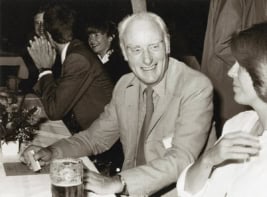
UPDATE July 21, 2011: Omid Kokabee’s trial has been postponed to an unspecified date, according to friends.
A doctoral student who was detained when he tried to leave his native Iran earlier this year will go on trial tomorrow for charges related to espionage, according to sources close to him.
Omid Kokabee has been detained since late January or February this year when he was attempting to fly from Tehran airport to return to his studies at the University of Texas at Austin, US. Physics World understands that he is suspected of leaking Iranian scientific information and working with the CIA.
The trial, apparently based on charges of illegal earnings and communicating with a hostile government, is expected to be headed by Iranian justice Abolghasem Salavati.
Harsh sentence possible
“[Salavati] is known for passing harsh sentences to innocent people,” says Eugene Chudnovsky of the Committee of Concerned Scientists, an international human rights organization. “It is impossible to predict, but I cannot even rule out the death penalty if the purpose is to scare Iranian students abroad. Iran has conducted a record number of executions this year.”
Kokabee, 29, graduated in applied physics and mechanics from the Sharif University of Technology in Tehran in 2005, and went on to receive a master’s degree in optics from the University of Barcelona, Spain, last year. During this period he worked for several companies, including Zener Electronics, based in Iran, and National Iranian Oil. In autumn last year he began a PhD at Austin, studying the interaction of lasers with plasmas.
“Being an applied scientist and having a great taste of engineering from my bachelors, my passion is doing technology-based entrepreneurial business and hi-tech start-ups,” he writes on his LinkedIn page.
Studying optics and photonics
John Keto, the graduate adviser of Austin’s physics department, doesn’t understand why Kokabee’s area of study would be of interest to the Iranian authorities. “Initially the web was full of wrong information about Omid being a world expert in nuclear physics,” he says. “Omid’s presence here was much more innocent than all of that. He was simply a new graduate student taking courses, teaching and beginning his PhD in optics and photonics.”
Other friends and colleagues speculate as to the real reasons behind Kokabee’s arrest. One suspicion is that he has been used as a scapegoat to discourage student participation in Iran’s Green movement, which believes that Iranian president Mahmoud Ahmadinejad was unfairly elected to office in the country’s 2009 election. According to Keto, the Green movement has used Kokabee’s detention to promote its cause. “Perhaps this has further jeopardized his situation there,” Keto says. “Omid was not associated with this reform movement, but mainly concentrated on his science and family.”
One friend, who wanted to remain anonymous, agrees that Kokabee didn’t have much interest in politics: “He was really not a political activist. I shared a room with him for a few years, and he was really not into politics at all. All he cared about was laser physics. I had friends who were into politics, but he was not.”
Kokabee is thought to have been apprehended at Tehran airport while awaiting a flight to Dubai to collect a visa from the US embassy. He was supposed to go on to fly to Austin a week later.
Notorious prison
Close friends of Kokabee say he has spent most of the last few months at the Evin prison in north-west Tehran. Evin has become notorious in recent years for the number of academic and political prisoners detained there as part of Iran’s crackdown on individuals claimed to be involved in espionage for Western states.
Yesterday the Committee of Concerned Scientists sent an open letter requesting clemency to Ali Khamenei, supreme leader of Iran. Meanwhile, Kokabee’s lawyer hopes that pressure from the media and academia will help the student’s case.



